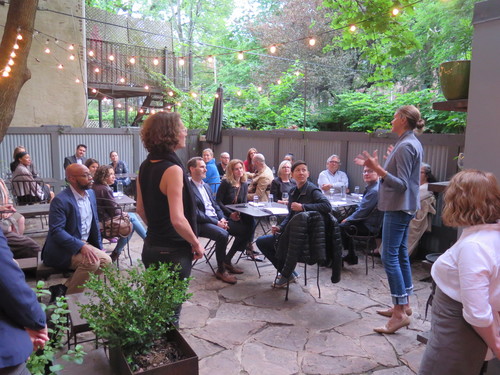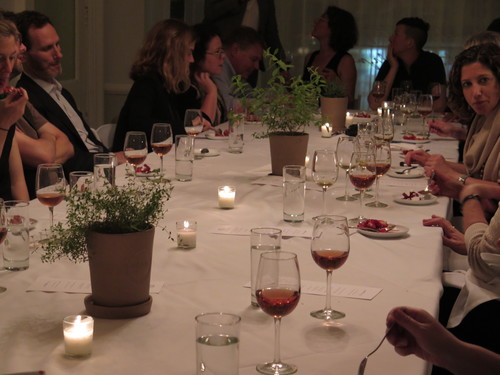 A couple weeks ago, the wine importer Camille Rivière & myself hosted a wine dinner at ICI (now called Maison May Dekalb), pouring biodynamic wines from Jura, a region sandwiched between the Alps & Burgundy. At the end of the evening, several guests commented on what a delicious, unpretentious and eye-opening experience this dinner was. I have been drinking solely natural or biodynamic wines for the past 18 years now, and I truly enjoy introducing them to people who have never before tasted these kind of wines. It’s like watching someone who has only eaten Perdue chicken try a chicken from Violet Hill Farm for the first time. Once they taste the difference, they never go back.
A couple weeks ago, the wine importer Camille Rivière & myself hosted a wine dinner at ICI (now called Maison May Dekalb), pouring biodynamic wines from Jura, a region sandwiched between the Alps & Burgundy. At the end of the evening, several guests commented on what a delicious, unpretentious and eye-opening experience this dinner was. I have been drinking solely natural or biodynamic wines for the past 18 years now, and I truly enjoy introducing them to people who have never before tasted these kind of wines. It’s like watching someone who has only eaten Perdue chicken try a chicken from Violet Hill Farm for the first time. Once they taste the difference, they never go back.
Here is what I think about wine and why I drink what I drink & nothing else.
I did not always think the way I do now about wines. If I’m being honest, I used to be somewhat of a wine snob. But then something happened to make me step down off of that pedestal.
I was 25, working and eating in high-end restaurants in Manhattan. As an aspiring restaurateur, it was part of my career to study, drink and experiment with wines, so while I wasn’t necessarily a wine expert, I had a strong basic set of knowledge.
Late one night, after a busy evening shift, a few foodie friends and I gathered in Red Hook, Brooklyn to end the night with some good wine and good company. One person had brought a very expensive, very old bottle of Bordeaux (for the life of me, I cannot remember its name). We threw out these big words, making analogies to other wines we loved.
We were half way through the bottle, when Guillermo came in (think Red Hook circa 1998 before IKEA and Fairway, among other new developments): he was this sweet older Columbian gentleman, whom I had met many times at my friend’s house. He was living in the streets, trying to stay out of trouble. He always had some crazy story to share and a deep love for cheap beer & even cheaper vodka…
When my friend proceeded to give Guillermo a full glass of our spectacular wine, I couldn’t help but feel puzzled, almost disapproving. My friend noticed my expression and told me: “Well, I don’t know what makes you think that your tongue is better than his. We all have taste buds, don’t we? I am sure Guillermo will appreciate this wine…”
It was like a big slap in my face: how absurd – and how vain – to consider Guillermo incapable of appreciating fine wine. My attitude towards Guillermo had been pretty much the same as barring him from looking at a Picasso because he wasn’t an art connoisseur.
From that day forward, I vowed to approach wine in the same way that I approached food. One doesn’t need to memorize all sorts of data in order to be able to appreciate good food. Why should wine be any different?
Around the same time, I had another epiphany about the way I was sourcing food for my family and me. I began to ask myself: What is in the food I eat? Who is making this food? How are they making it? It was a natural progression then to ask the same questions about my wine: What is in the wine I drink? Who makes it? How is it made?
I’ll spare you a long lecture on winemaking, but I would like to give you a very condensed idea of what actually happens in the vineyards. Who knows, I might just shatter a few illusions…
Let’s start at the beginning: Wine is an alcoholic beverage typically made from fermented grapes, and sometimes from other fruits. There are many steps in the process, but the essential ones are and where different degrees of human intervention can occur are: growing the fruit, fermenting the fruit, and bottling the juice. Chemicals can be added at any one of those stages. You may have noticed that in addition to conventional wines, some wines are sometimes called “organic,” “natural” or “biodynamic.”
Organic means they use organically grown grapes that are then fermented with different levels of chemical additives. To me, this is a step in the right direction but still a bit pointless—like growing an organic apple, then covering it in chemicals before you sell it.
Wines that are grown with organic grapes, then fermented with minimal chemicals, or none at all, are natural wines—a much better choice.
 Then there are biodynamic wines: those that use organically grown grapes that have been carefully fermented and bottled without anything but earth and sun (following the careful lunar and solar rules coded by Rudolph Steiner in the early 19th century). There is intervention in the vineyards & fermentation but the entire process is really holistic and completely chemical free.
Then there are biodynamic wines: those that use organically grown grapes that have been carefully fermented and bottled without anything but earth and sun (following the careful lunar and solar rules coded by Rudolph Steiner in the early 19th century). There is intervention in the vineyards & fermentation but the entire process is really holistic and completely chemical free.
Finally, you have conventional wines, which may use chemical spray in the vineyards, or many additives during the fermentation and bottling stages to control anything such as the speed of the fermentation, the wine’s taste, color, aroma, smell, longevity and other attributes. The different degrees to which a winemaker can alter the natural process are limitless, and sometimes absolutely drastic. For example, have you ever wondered how a particular Champagne (let’s say a famous brand that has a yellow label…) can taste the same year after year, rain or shine, early frost or not? This is because the winemaker has carefully coded the Champagne’s reproduction with additives that ensure his costumers will recognize its taste and flavors, no matter what nature has wrought on the grapes themselves. For me, these types of Champagnes and wines are no different than a can of Coke. And since I don’t drink sodas… That leaves me with two options: natural or biodynamic wines.
Similarly to how we choose our food (and food sources), the consequences of our choices in wine go far beyond our health. They have a great impact on the planet: grape varietals are being extinguished, soil is being depleted, chemicals are polluting our rivers, and labor practices in large estates are no better than on large corporate farms. Like food, wine can and should be alive when consumed and have that vibrant quality where you can almost smell the soil, taste the sun and feel the breeze that once bathed the vines.
Here are my favorite wines for this summer:
Poivre & Sel from Olivier Lemasson – A vibrant Pineau d’Aunis from the Loire, to be enjoyed slightly chilled.
Cerdon du Bugey from Domaine Renardat-Fache: Sparkling Rosé – It is pure happiness in a bottle, it brings people together.
Muscadet from Pierre Lagrange: It is my go-to wine that works whatever mood I am in.
You can find all of these bottles on Maison May Dekalb’s wine list.
It should be no surprise that our selection is 100% natural and biodynamic.
As you can see, there is a lot that goes in to choosing a wine. The most important thing is that you either need to know the vineyard, or trust that the wine importer is doing his job in verifying what he is selling you. That’s why working with the right importer is so crucial, and why I take the time to develop relationships with them.
When you buy your favorite wine, ask the vendor if he or she knows how the wine was made. For imported wines from Europe, the wine importer will be listed on the back of the bottle, and you can always inquire with them directly. My two absolute favorite importers are Louis Dressner and Camille Rivière. No need to call these estates to check the way their wines are made because they have already done a thorough job for you.
And above all, remember, it is all about enjoying what you are drinking.
Happy Summer!